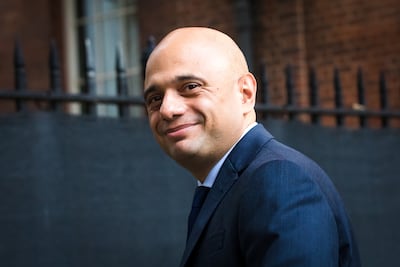UK Health Secretary Sajid Javid used his speech at London Tech Week on Tuesday to call for the "opportunities of digital transformation" to be spread across the whole of the country's National Health Service.
While he described the service as making "great progress" on digital innovation, he said one tenth of the state system was still operating on paper-based systems and 71 per cent of its social care arm has no access to patients' digital medicine records.
"Too much of the system doesn't currently have the basics in place, which frustrates patients and makes life harder for colleagues on the front line," he said.
Mr Javid's paean to technology's transformative powers was pegged on how crucial it has proved in the fight against coronavirus, which he said would have been "so much harder without the technological advances we've made in recent years".
He lauded digital video-calling platforms such as Zoom for allowing businesses to keep operating and friends and family to stay in touch. However, he said "nowhere has tech transformation proved its worth more than in the field of health care".
He paid tribute not only to frontline workers but to the coders and developers whose contributions can go unnoticed.
"We developed an online diagnosis that was able to carry out 750,000 online coronavirus assessments in just one day," he said.
"We used primary care data to securely create the world's largest analysis of coronavirus risk factors at incredible speed.
"And we created a seamless vaccination booking system that was visited 18 million times in a single week."

Mr Javid said he hoped the progress made during the pandemic under "incredible" strain would pave the way for a "long-awaited digital revolution".
He said the building blocks of this revolution would see cybersecurity bolstered, out-of-date technology replaced and the adoption of a "truly integrated system" where health service employees can access patient data regardless of what part of the system they are in.
Digital integration to transform patient care
Digital integration of services has been an albatross around the neck of a series of Mr Javid's predecessors in the Health Ministry but he suggested that by the end of September, 80 per cent of integrated care systems will have a shared record in place, up 65 per cent from six months ago.
The effect of digital integration was made manifest on Mr Javid's recent visit to a hospital in Milton Keynes where he said the time spent searching for patients' records had reduced from 15 minutes to about 30 seconds.
For care homes the increased efficiency would lead to an extra 10 hours of care work per patient, he said.
He predicted efficiency would only increase as the system adjusts to increased digitisation and said it was "no coincidence that the five countries at the top of the Bloomberg health system efficiency table are the ones that have embraced data and data driven technologies".
Bloomberg health system efficiency table - top five
1. Hong Kong
2. Singapore
3. Spain
4. Italy
5. South Korea
As further testament to digital efficiency, he highlighted the NHS app, which now has 16 million users, and online registrations for organ donations, which stand at about 1.5 million in the UK.
Contrasting health care to his previous domain of finance and industry, he flagged up the possibility of more jobs and the genesis of productive offshoots in the manner of mobile banking.
A chorus of criticism has been levelled at how face-to-face appointments with general practitioners and nurses are becoming increasingly rare. Mr Javid acknowledged the concerns but sought to accentuate the positive.
He said many patients discussing mental health appreciated the ability to do so in a familiar and comfortable environment.
He highlighted the diagnostic capabilities that health tech and AI can bring to the aid of an overstretched service. In May, The National revealed how AI played a vital role in the fight against coronavirus.
The examples Mr Javid provided were smartphone apps that can detect warning signs for chronic kidney disease, and a programme that can analyse speech patterns to detect common neurological and psychiatric diseases.
"I'm delighted that over a quarter of NHS trusts in England are deploying at least one solution that's been funded by AI, Health and Care awards," he said.

